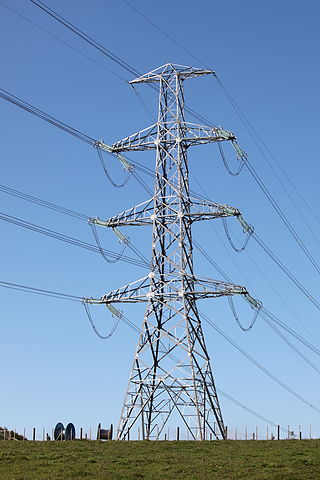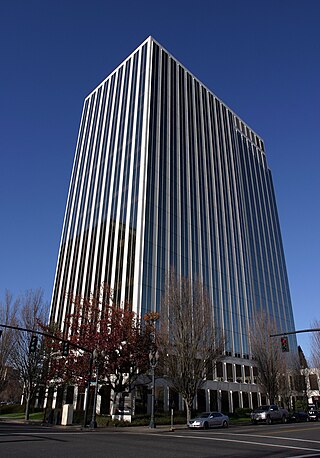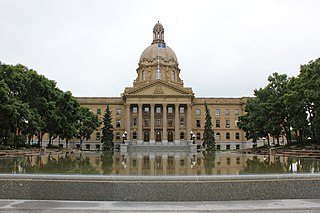
The electric power industry covers the generation, transmission, distribution and sale of electric power to the general public and industry. The commercial distribution of electric power started in 1882 when electricity was produced for electric lighting. In the 1880s and 1890s, growing economic and safety concerns lead to the regulation of the industry. What was once an expensive novelty limited to the most densely populated areas, reliable and economical electric power has become an essential aspect for normal operation of all elements of developed economies.
The British Columbia Hydro and Power Authority, operating as BC Hydro, is a Canadian electric utility in the province of British Columbia. It is the main electricity distributor, serving more than 4 million customers in most areas, with the exception of the City of New Westminster, where the city runs its own electrical department and portions of the West Kootenay, Okanagan, the Boundary Country and Similkameen regions, where FortisBC, a subsidiary of Fortis Inc. directly provides electric service to 213,000 customers and supplies municipally owned utilities in the same area. As a provincial Crown corporation, BC Hydro reports to the BC Ministry of Energy, Mines and Low Carbon Innovation, and is regulated by the British Columbia Utilities Commission (BCUC). Its mandate is to generate, purchase, distribute and sell electricity.

ATCO Ltd., operating as the ATCO Group, is a publicly-traded Canadian engineering, logistics and energy holding company based in Calgary, Alberta. ATCO's subsidiaries include electric utilities, natural gas production and distribution companies, and construction companies.
Enbridge Inc. is a multinational pipeline and energy company headquartered in Calgary, Alberta, Canada. Enbridge owns and operates pipelines throughout Canada and the United States, transporting crude oil, natural gas, and natural gas liquids, and also generates renewable energy. Enbridge's pipeline system is the longest in North America and the largest oil export pipeline network in the world. Its crude oil system consists of 28,661 kilometres of pipelines. Its 38,300 kilometre natural gas pipeline system connects multiple Canadian provinces, several US states, and the Gulf of Mexico. The company was formed by Imperial Oil in 1949 as the Interprovincial Pipe Line Company Limited to transport Alberta oil to refineries. Over time, it has grown through acquisition of other existing pipeline companies and the expansion of their projects.
Fortis Inc. is a St. John's, Newfoundland and Labrador-based international diversified electric utility holding company. It operates in Canada, the United States, Central America, and the Caribbean. In 2015, it earned CA$6.7 billion.

The electricity sector in Canada has played a significant role in the economic and political life of the country since the late 19th century. The sector is organized along provincial and territorial lines. In a majority of provinces, large government-owned integrated public utilities play a leading role in the generation, transmission, and distribution of electricity. Ontario and Alberta have created electricity markets in the last decade to increase investment and competition in this sector of the economy.

TransAlta Corporation is an electricity power generator and wholesale marketing company headquartered in Calgary, Alberta, Canada. It is a privately owned corporation and its shares are traded publicly. It operates 76 power plants in Canada, the United States, and Australia. TransAlta operates wind, hydro, natural gas, and coal power generation facilities. The company has been recognized for its leadership in sustainability by the Dow Jones Sustainability North America Index, the FTSE4Good Index, and the Jantzi Social Index. TransAlta is Canada's largest investor-owned renewable energy provider.
NV Energy is a public utility which generates, transmits and distributes electric service in northern and southern Nevada, including the Las Vegas Valley, and provides natural gas service in the Reno–Sparks metropolitan area of northern Nevada. Based in Las Vegas, Nevada, it serves about 1.3 million customers and over 40 million tourists annually.

A regional transmission organization (RTO) in the United States is an electric power transmission system operator (TSO) that coordinates, controls, and monitors a multi-state electric grid. The transfer of electricity between states is considered interstate commerce, and electric grids spanning multiple states are therefore regulated by the Federal Energy Regulatory Commission (FERC). The voluntary creation of RTOs was initiated by FERC in December 1999. The purpose of the RTO is to promote economic efficiency, reliability, and non-discriminatory practices while reducing government oversight.

Enmax Corporation is a vertically-integrated utility with operations across Alberta, Canada, and in Maine, US.

EPCOR Utilities Inc., formerly known as Edmonton Power Corporation, is a utility company based in Edmonton, Alberta. EPCOR manages water, wastewater, natural gas, and electricity distribution systems in the Canadian provinces of Alberta, British Columbia, and Ontario, and the American states of Arizona, New Mexico, and Texas. In addition, the company maintains and provides engineering support for traffic signals and street lights within the City of Edmonton, as well as other cities in Alberta. EPCOR is a municipally owned corporation with the City of Edmonton as sole shareholder.

PacifiCorp is an electric power company in the western United States.
Berkshire Hathaway Energy is a holding company and subsidiary of Berkshire Hathaway, which owns 100% of the company. Berkshire has owned a controlling stake since 1999. The company also controls power distribution companies in the United Kingdom and Canada.

Canada has access to all main sources of energy including oil and gas, coal, hydropower, biomass, solar, geothermal, wind, marine and nuclear. It is the world's second largest producer of uranium, third largest producer of hydro-electricity, fourth largest natural gas producer, and the fifth largest producer of crude oil. In 2006, only Russia, the People's Republic of China, the United States and Saudi Arabia produce more total energy than Canada.

The electricity policy of Alberta, enacted through several agencies, is to create an electricity sector with a competitive market that attracts investors, while providing consumers with reliable and affordable electricity, as well as reducing harmful pollution to protect the environment and the health of Albertans, according to their 2022 website.
Natural gas was Canada's third largest source of energy production in 2018, representing 22.3% of all energy produced from fuels in the country. By contrast, the share of fuel-based energy production from natural gas in 2013 was 17.0%, indicating a growth rate of approximately 1.06% per year.

The Alberta Electric System Operator (AESO) is the non-profit organization responsible for operating Alberta, Canada's power grid. AESO oversees the planning and operation of the Alberta Interconnected Electric System (AIES) in a "safe, reliable, and economical" manner. It is mandated by provincial legislation to act in the public interest and cannot own any transmission, distribution or generation assets.
Gregory Edward Abel is a Canadian businessman, chairman and CEO of Berkshire Hathaway Energy, and vice-chairman of non-insurance operations of Berkshire Hathaway since January 2018.














